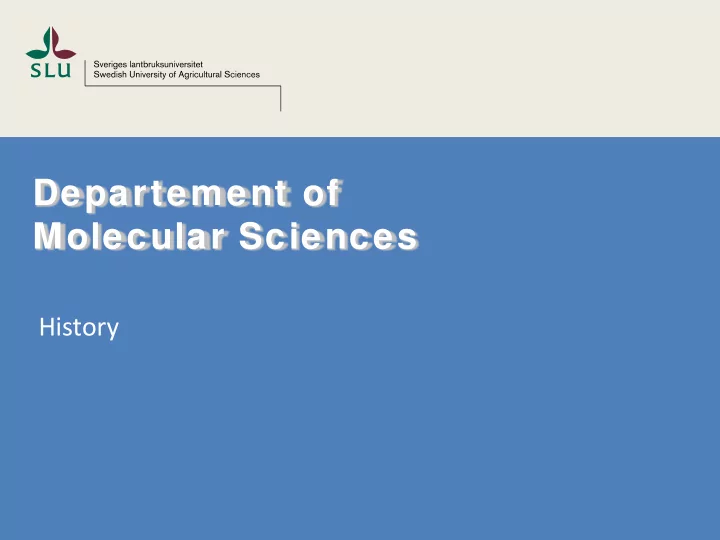

Departement of Molecular Sciences History
SLU’s oldest Department… 1841 1932 Ultuna lantbruksinstitut bildas Lantbrukshögskolan bildas Johan Arrenius, professor Institutionen för kemi och agrokemist 1840 1850 1930 1940 1950 1960 /\ and youngest!
Department of Molecular Sciences Personnel
Personnel In total 81 full-time employees (July 2018), 140 on e-mail list 15 Professors 5 Senior Lecturers (of which 2 adjunct Senior Lecturers) 12 Senior Researchers 15 Researchers, 7 research assistents/research engineers, 18 postdocs 29 PhD students 4 administrators Totalt 47 % women, 53 % men
Department of Molecular Sciences Research Education
Research education • 29 PhD students – Chemistry – 6 – Biologi in total – 13 (3 microbiology, 4 biotechnology, 1 molecylar biology and 5 general biology) – Food science – 10 (4 industrial PhD students) • Aktive participation in research schools – Focus on Food and Biomaterials, SLU; Organism biology, SLU • Advanced subject and method courses at SLU, nationally and internationally – f.ex. NMR; Mass-Spec; Advanced microscopy, EXAFS, X-ray, Biomaterials on nanoscale etc.
Thesis defences Year 2015 2016 2017 2018 PhD 8 9 5 5 Licentiate 1 1 0 0
Research education With us is FUN!
Department of Molecular Sciences Research
Organizing role in the molecular research • Chemical Side of SLU conferences The aim is to provide an updated overview of the chemical research at SLU, help in establishing of new contacts and cooperation.
Collaborations at SLU Molecular Sciences Forestry VH • Forest products • Anatomy, Wood quality Physiology Forest Mycology • Biochemistry NJ and Plant Chemistry • Pathology • Biotechnology • Microbiology • Plant biology • Food Science LTV Forest Mycology and • Plant Pathology • Plant • Ecology Breeding • Soil and Environment • Aquatic Sciences and Assessment • Energy & Technolgy
Strategic objectives • Development of analytical methods for structural determination of natural products and materials with special focus on biogenic processes in nature. • Development of biotechnology and bionanotechnology approaches for rational use of natural resources, production of high quality tasty food, functional materials, environmental monitoring and soil and water remediation
Research areas • Food quality • Food and feed microbiology • Chemistry and biology at interfaces • Functional nanomaterials • Molecular metabolism • Molecular structures • Molecular biotechnology • Biochemistry and molecular cell biology
Metabolomics platform Project samples Food Metabolic effects of whole grain cereals on humans 1 800 12 Effect of diets for newborns with rheumatic disease 200 BarleyFunFood project 220 Absorption of nutrients in pigs 200 Is obesity in dogs associated with inflammatory markers and the gut microbiota? Value of different feed in chickens 80 Chronic diseases 1 700 Prostate cancer Childhood obesity and Type 2 diabetes 800 Alzheimer disease 800 Breast Cancer biomarkers 2 000 170 Endometrial cancer 100 Glutamate signaling in brain Aquaculture and feed optimization 500 Microorganisms and plants 100 Secondary metabolite comparison of root-rotting fungi Comparison of different genotypes of common ash in response to the 125 phytotoxin viridiol >13 000 New metabolites from microorganisms in search for new antibiotics Crops > 300 Growing conditions and developments of roots from seabuckthorn 14
Strong research infrastructure – X-ray diffraction (2015) – Atomic force microscopy (2016) – Environmental scanning electron microscopy (2008) – Thermogravimetric and vibrational spectroscopy (2010)
Strong research infrastructure Two NMR-spectrometers (2012) Four mass spectrometers (2012-2017) Intact tissues Biomolecules in solution Plants, microorganisms Biofluids, extracts August T Larssons Industrial donations KoN evaluation
Synchrotron facilities
Department of Molecular Sciences Welcome!
Recommend
More recommend